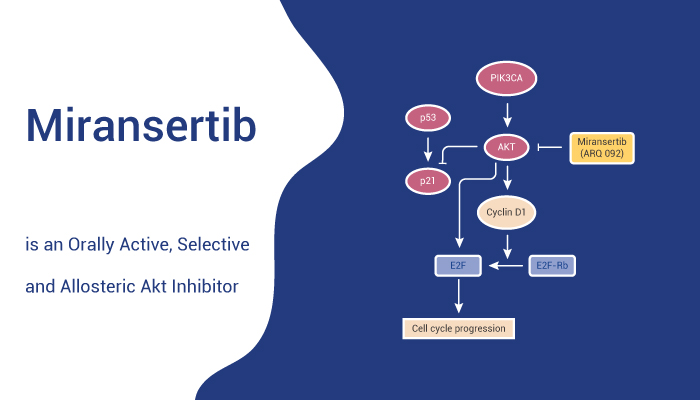In almost half of hepatocellular carcinoma (HCC) cases, the Akt pathway is activated. Miransertib is a highly selective, orally active, pan-Akt inhibitor. Miransertib target all three Akt isoforms by blocking its phosphorylation and by preventing the inactive form from localizing into plasma membrane which together leads to potent and specific downregulation of downstream targets of AKT. In addition, Miransertib controlls infections of L. donovani and L. amazonensis. Therefore, Miransertib can be used for anti-cancer and infection research.

Miransertib potentiates inhibition of tumor progression and has anti-leishmanial activity
In vitro, Miransertib significantly increases early apoptotic cells and suppresses cell proliferation in Hep3B cells. Miransertib can reduce migration in an additive manner in Hep3B, HepG2, Huh-7 and PLC/PRF cell lines.
In vivo, Miransertib significantly reduces tumor progression and improve liver function in diethylnitrosamine-induced cirrhosis rats model. Miransertib has a lower number of tumors by macroscopic counting. Besides, Miransertib decreased vascular density by 58% (p < 0.0001). As for liver fibrosis analyzed by Sirius red staining, Miransertib decreases hepatic collagen deposition and improves liver fibrosis in DEN-induced cirrhotic rats.
For in vivo efficacy of Miransertib, Miransertib effectively suppresses parasite burdens by 80–90%. Miransertib reduces the cutaneous lesions of 32 and 40% in 50 or 100 mg/kg treatment BALB/c mice. Also, Miransertib is effective in attenuating phosphorylation of macrophage Akt during infection. Miransertib treatment attenuats the phosphorylation of macrophage Akt in macrophage in a concentration dependent manner.
To sum up, Miransertib is a selective pan Akt inhibitor. Miransertib inhibits the activity of all three Akt isoforms. Miransertib can be used for anti-cancer and infection research.
Reference:
[1] Jilkova ZM, et al. Oncotarget. 2018 Jan 23;9(13):11145-11158.
[2] Nandan D, et al. PLoS One. 2018 Nov 6;13(11):e0206920.